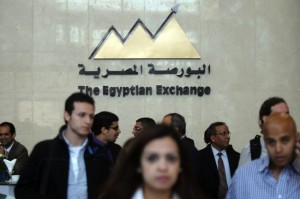
(AFP Photo)
Despite the poor performance of the Egyptian capital market since the beginning of 2015, this year saw the largest number of initial public offerings (IPOs) and propositions from major companies since 2007, prior to the outbreak of the global finance crisis.
Local stock exchanges witnessed three large IPOs, including Orascom Construction, which was founded based on the distribution of activities by OCI NV, between contracting and fertiliser activities, where the IPO reached EGP 1.4bn. The second IPO was by Edita Food Industries, and was worth EGP 2bn, where the IPO was oversubscribed by 4.5 times.
The IPO by Emaar Misr reached an exceptional rate of oversubscription of 36 times, with the value of the IPO reaching EGP 2.28bn.
According to experts in the capital market, the remarkable change in the number of IPOs in the light of the negative indicators that took over the market’s performance and trade size is considered a clear change in the fundamental rule of offerings that requires the excellence of indicators and enlargement of trade to ensure large demand on offerings. This is highlighted by the fact that the offered shares by the three companies were not low.
The local exchange declined since the beginning of the year by 9.5%, while the average size of trade ranged from EGP 250m – EGP 500m per day. This was mainly due to the current government’s imposition of the capital gains tax on the exchange market, accompanied by intense selling by local investors before the Prime Minister announced the postponement of capital gains tax for two years. However, the decision to postpone the tax has yet to be implemented.
“The nature of the investment opportunities offered by the companies was the main reason why these propositions succeeded in terms of the size of IPO subscriptions, despite the poor performance of the market,” said Hassan El-Sherbiny, former managing director of the brokerage sector in Pharos Investment Bank.
The three companies are characterised by strong financial indicators, especially Edita, which is classified among the biggest local companies of food industries, as well as Emaar Misr. Orascom Construction has a large growth opportunity in the field of construction, according to El-Sherbiny.
During the first quarter of this year, Edita achieved a net profit of EGP 81.3m, Orascom achieved $9.5m, while Emaar Misr reached sales of EGP 3.9bn during the first half of the year.
According to El-Sherbiny, the large rate of IPO subscriptions could be considered regular if the pricing was low in the light of the poor performance of the Egyptian market. However, Emaar Misr’s shares had high prices. Further, Orascom and Edita did not have shares with low prices, especially as Edita witnessed partial exits by direct investment companies, such as Actis Direct Investment.
There are reasons that are unrelated to investment feasibility that lead to higher levels of IPO subscriptions, according to El-Sherbiny. These include the IPO conditions that stipulate that investors can buy 25% of the shares they registered during the IPO, which means that the IPO size reflects four times the shares actually required. Some even register larger amounts to ensure attaining the targeted amount of shares during the privatisation process after the completion of the offering.
The role of this choice became clear during Emaar Misr’s IPO, in the light of banks and brokerage companies provision of loans in the form of credit during offering processes. This eventually led to intensified selling that Emaar Misr shares witnessed during the trade session that came after the IPO.
“A large number of major companies were written off from the Egyptian stock exchange for different reasons. The companies included Vodafone, Orascom Construction Industries, National Societe General Bank (NSGB), BNP Paribas and Bisco Misr, in addition to French ‘Orange’ buying most of Mobinil’s traded shares, leading to increasing Egyptian and foreign investors’ enthusiasm towards the IPO propositions,” according to Hany Helmy, Chairman of Al-Shorouk Brokerage Co.
Another important factor that affected the success of the IPO subscriptions from Helmy’s point of view was the fact that offered shares are expected to increase faster than traded shares, because the latter are declining and this means they need to be replaced with new shares. There are also expectations that the Egyptian market will rise in general during the upcoming period by 15-20%, bringing new investment opportunities.
Another explanation involves investors coping with the political and security turmoil in Egypt throughout the past four years, making it among the basic investment risks.
The more important question is how billions of pounds flowed into the exchange for the subscription of IPOs –except in Emaar Misr’s case, which witnessed a remarkable emergence of credit – despite the low size of trade.
Helmy said that one of the sources of money provided for offerings is the investors selling parts of their portfolios and re-injecting them into offering processes.
“The experience of financing the new Suez Canal through investment certificates has proved the Egyptian market’s ability to provide cash money through the parallel economy, which was the case with the offerings,” said Ayman Hamed, Managing Director of the Brokerage Sector of Naeem Investment bank.
He added that there is a disagreement over the ability of upcoming IPOs to achieve such success, where the decline that took over Emaar Misr’s shares after the IPO will weaken the demand on any upcoming propositions.
Helmy, however, stated that he believes that the market needs dozens of IPOs in the fields of food industries, communications, technology and industry in order to add depth to the market and reduce the fluctuation of market indicators.




